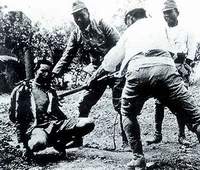Film about mass slaughter and rape of Chinese citizens stirs up scandal
China's scissor-happy censors quickly approved without edits a U.S.-made film about Japan's mass slaughter of Chinese citizens in the World War II era, but the movie has gotten the cold shoulder in Japan, the filmmakers said Wednesday.

"Nanking," an American documentary about the rape and slaughter of thousands of Chinese at the hands of Japanese soldiers beginning in the fall of 1937, premiered in Beijing on Tuesday and will have a staggered released in cities across the country later this week.
The film's producer, Ted Leonsis, said China's State Administration of Radio, Film and Television, or SARFT, approved the movie for theatrical release within 48 hours of its submission last week and made zero changes.
The film will reach an even broader audience when it is aired in about six months on Chinese Central Television, he said.
Leonsis and co-director Dan Sturman said they thought SARFT let the film through untouched because it agreed with China's official version of what happened in Nanjing after the city fell to the Japanese. They said China also realized it might be politically useful to have a third party corroborate their version of history.
"I do think politically, the Chinese say 'OK, someone else is saying that this incident happened. It's not our word against the Japanese word,"' said Leonsis, who is also vice chairman of the American Internet company AOL.
The film, which was partly shot in the former capital of Nanjing, tells the story of a handful of Western expatriates who used the U.S. flag and the Nazi arm band to shield huge numbers of Chinese in a safe zone when the Japanese took over the city. It mixes archival footage and dramatic readings of original diary entries and letters by actors, including Woody Harrelson and Mariel Hemingway.
Historians generally agree the Japanese army slaughtered at least 150,000 civilians and raped tens of thousands of women in the rampage in Nanjing in 1937 that became known as "The Rape of Nanking," using the name by which the city was known in the West at that time.
"I suspect that (China's censors) recognize that there is value to having a film that was made without, you know, having any interference from them," Sturman said. "It has an integrity, it's more unassailable."
Although the film has been warmly welcomed in China, which caps the number of foreign films allowed in Chinese theaters each year and is known for its iron-fisted control over film and television productions, it has yet to be picked up for distribution in Japan, where cultural controls are generally looser.
Sturman said the filmmakers were trying to get the film into Japanese film festivals and "pursuing every avenue to get it seen as widely as possible in Japan."
"I am hopeful that a distributor has the courage to bring the movie into theaters and on television in Japan and let people watch it and make their own decisions," Leonsis said.
About 100 Japanese ruling party lawmakers last month said documents from their government's archives indicated only about 20,000 people were killed in the 1937 attack. The head of the group accused China of inflating the number of victims for propaganda purposes.
Many Japanese conservatives are disgruntled over what they say are exaggerated stories of Japanese brutality during World War II.
Leonsis said such attempts "to minimize or try to negate" what the victims went through were "offensive" and "unfair."
"Thank goodness we made this film when we did because it's an unmakable film five or 10 years from now because all the survivors will pass on," said Leonsis, who plans to make the documentary and additional filmed testimonials freely available on the Internet. "Now they'll be preserved forever, these eyewitness testimonies."
Subscribe to Pravda.Ru Telegram channel, Facebook, RSS!


